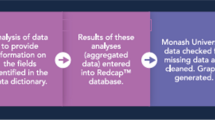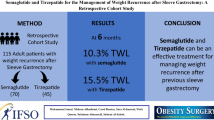Abstract
Background
The role of laparoscopic sleeve gastrectomy (LSG) has increased over the past 10 years. We present our results of patients who were 5 years out from surgery with regard to safety and long-term efficacy.
Methods
Retrospective analysis was carried out from prospectively collected data of patients who underwent LSG for morbid obesity. Bariatric Analysis and Reporting Outcome System (BAROS) and Food Tolerance Scores (FTS) were assessed. At 5 years, two lifestyle modification questions (regarding nutrition habits and physical fitness) were separately assessed.
Results
One hundred fourteen patients underwent LSG and were available for postoperative visits. Mean excess weight loss (EWL) was >65 % during the initial 3 years and declined to 45.3 % in 5 years. Of the patients, 71.92 % did not reach 50 % EWL at 60 months and were considered objective failures. BAROS and FTS scores were 7.15 and 4.32, and 23.5 and 22.5 at 30 and 60 months, respectively. Analyzing the 32 patients with EWL >50 % in the 5-year group, 26 (81.25 %) of them had scored ≥0.5 on the two lifestyle modification questions compared with 6 (18.75 %) that scored <0.5 (P < 0.001).
Conclusion
LSG is an effective bariatric surgical procedure with significant long-term (5 year) weight loss, resolution of comorbid medical conditions and significant improvement in the quality of life. The basis for this success, which must be always emphasized preoperatively by the bariatric team, is knowledge and implementation of better nutritional habits and increasing physical fitness or, in other words, in significant lifestyle modification.

Similar content being viewed by others
References
James PT, Rigby N, Leach R. International Obesity Task Force—the obesity epidemic, metabolic syndrome and future prevention strategies. Eur J Cardiovasc Prev Rehabil. 2004;11(1):3–8.
Dymek MP, Le Grange D, Neven K, et al. Quality of life and psychosocial adjustment in patients after Roux-en-Y gastric bypass: a brief report. Obes Surg. 2001;11(1):32–9.
Keren D, Matter I, Rainis T, et al. Getting the most from the sleeve: the importance of post operative follow-up. Obes Surg. 2011;21:1887–93.
Deitel M, Gawdat K, Melissas J. Reporting weight loss. Obes Surg. 2007;17:565–8.
Deitel M, Greenstein RJ. Recommendations for reporting weight loss. Obes Surg. 2003;13:159–60.
Himpens J, Dobbeleir J, Peeters G. Long-term results of laparoscopic. Ann Surg. 2010;252:319–24.
Suter M, Calmes JM, Paroz A, et al. A new questionnaire for quick assessment of food tolerance after bariatric surgery. Obes Surg. 2007;17:2–8.
Reinhold RB. Critical analysis of long-term weight loss following gastric bypass. Surg Gynecol Obstet. 1982;155:385–94.
Heath V. Laparoscopic sleeve gastrectomy as the first-line surgical option for morbid obesity. Nat Rev Endocrinol. 2010;6(10):534.
Strain GW, Saif T, Gagner M, et al. Cross-sectional review of effects of laparoscopic sleeve gastrectomy at 1, 3, and 5 years. Surg Obes Relat Dis. 2011;7(6):714–9.
Kehagias I, Spyropoulos C, Karamanakos S, et al. Efficacy of sleeve gastrectomy as sole procedure in patients with clinically severe obesity (BMI ≤50 kg/m(2)). Surg Obes Relat Dis. 2013;9(3):363–9.
Deitel M, Gagner M, Erickson AL, et al. Third International Summit: current status of sleeve gastrectomy. Surg Obes Relat Dis. 2011;7:749–59.
Zachariah SK, Chang PC, Ooi AS, et al. Laparoscopic sleeve gastrectomy for morbid obesity: 5 years experience from an Asian center of excellence. Obes Surg. 2013;23(7):939–46.
Langer FB, Bohdjalian A, Felberbauer FX, et al. Does gastric dilatation limit the success of sleeve gastrectomy as a sole operation for morbid obesity? Obes Surg. 2006;16(2):166–71.
D’Hondt M, Vanneste S, Pottel H, et al. Laparoscopic sleeve gastrectomy as a single-stage procedure for the treatment of morbid obesity and the resulting quality of life, resolution of comorbidities, food tolerance, and 6-year weight loss. Surg Endosc. 2011;25(8):2498–504.
Wang Y, Liu J. Plasma ghrelin modulation in gastric band operation. Obes Surg. 2009;19:357–62.
Karamanakos SN, Vagenas K, Kalfarentzos F, et al. Weight loss, appetite suppression, and changes in fasting and postprandial ghrelin and peptide-YY levels after Roux-en-Y gastric bypass and sleeve gastrectomy: a prospective, double blind study. Ann Surg. 2008;247(3):401–7.
Frezza EE, Chiriva-Internati M, Wachtel MS. Analysis of the results of sleeve gastrectomy for morbid obesity and the role of ghrelin. Surg Today. 2008;38(6):481–3.
Gumbs AA, Gagner M, Dakin G, et al. Sleeve gastrectomy for morbid obesity. Obes Surg. 2007;17(7):962–9.
Melissas J. IFSO Guidelines for safety, quality, and excellence in bariatric surgery. Obes Surg. 2008;18:497–500.
Kafri N, Valfer R, Nativ O, et al. Health behavior, food tolerance, and satisfaction after laparoscopic sleeve gastrectomy. Surg Obes Relat Dis. 2011;7(1):82–8.
Sarela AI, Dexter SP, O’Kane M, et al. Long-term follow-up after laparoscopic sleeve gastrectomy: 8-9-year results. Surg Obes Relat Dis. 2012;8(6):679–84.
Bohdjalian A, Langer FB, Shakeri-Leidenmühler S, et al. Sleeve gastrectomy as sole and definitive bariatric procedure: 5-year results for weight loss and ghrelin. Obes Surg. 2010;20(5):535–40.
Conflict of Interest
Dr. Dean Keren, Dr. Ibrahim Matter, and Prof. Alexandra Lavy have completed the ICMJE uniform disclosure form at www.icmje.org/coi_disclosure.pdf and declare no support from any organization for the submitted work, no financial relationships with any organizations that might have an interest in the submitted work in the previous 3 years, and no other relationships or activities that could appear to have influenced the submitted work.
Author information
Authors and Affiliations
Corresponding author
Rights and permissions
About this article
Cite this article
Keren, D., Matter, I. & Lavy, A. Lifestyle Modification Parallels to Sleeve Success. OBES SURG 24, 735–740 (2014). https://doi.org/10.1007/s11695-013-1145-2
Published:
Issue Date:
DOI: https://doi.org/10.1007/s11695-013-1145-2




